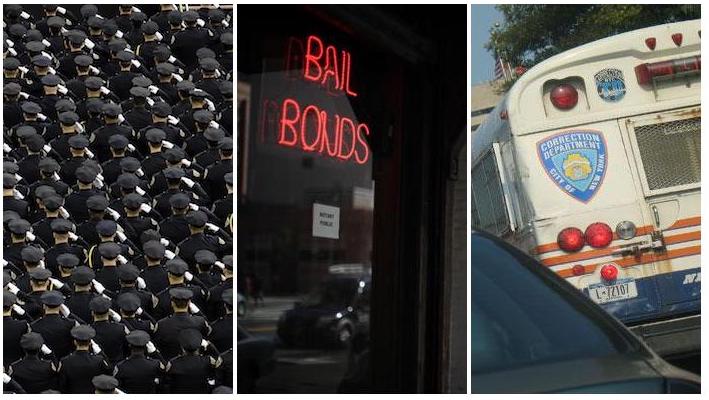
There are 2.2 million people in this country locked away in local, state, and federal cages. Meanwhile, 6.7 million people across the country are under the surveillance and control of correctional departments. In New York, Black New Yorkers make up 18 percent of the statewide population but nearly half of the population in prison. These outcomes are the result of deeply damaging policies. And policies are not created and enacted out of thin air.
The pre-trial laws that New York had until this year, “Broken Windows” policing, Stop and Frisk, mandatory minimum sentencing, drug courts, gang databases, and collaboration with ICE all have a clear origin. Legislators, prosecutors, and law enforcement officials, drafted, funded, and implemented policies that have torn apart, terrorized, extracted resources from, disenfranchised, and trampled on the rights of Black and Brown communities.
The tactics being employed to amend and roll back newly enacted changes to New York State’s bail laws are the same tactics used for decades to entrench racially discriminatory policies. NYPD Police Commissioner Shea, police union officials, District Attorneys, prosecutors, and Mayor de Blasio have all used racist fear-mongering or outright lies, correlating the new pre-trial laws to increases in crime data, without evidence, to pressure state legislators to change laws less than three months old. Despite our country still accounting for nearly a quarter of the world’s incarcerated population, certain elected officials and officials running state and city public safety agencies still haven’t quenched their appetite for feeding jails and prisons with Black and Brown bodies. Jails, prisons, and detention centers simply do not make our communities safer.
 CityViews are readers’ opinions, not those of City Limits. Add your voice today!
CityViews are readers’ opinions, not those of City Limits. Add your voice today!
Black and Latino communities and grassroots organizations in New York, led by people directly impacted by the criminal legal system organized, fought, and struggled to pass policies designed to root out the racialized targeting of our communities and free our community members from cages. As the population of people locked away has decreased, our communities have not seen a rise in crime. That’s because prisons and detention centers perpetuate violence and punishment, but are ineffective at addressing the root causes of crime and harm. Organizers and activists from communities of color are redefining public safety by dismantling policies and practices rooted in criminalizing Blackness and punishing poverty. Instead, we are creating and advancing approaches to divest from police and prisons and investing in robust social services, housing, and mental health supports.
Rolling back New York’s bail reforms now, by giving judges and prosecutors the ability to detain people pre-trial, based on their interpretation of “dangerousness,” isn’t grounded in public safety. It is grounded in maintaining a criminal legal system to control and oppress Black and Brown communities. Judges and prosecutors have been driving racial disparities across the criminal legal system since its existence. Neither are computer algorithms, fed with data from a biased system, going to address racial inequities. The Senate’s newest proposal, supposedly created to eliminate cash bail, will ensure more Black and Latino New Yorkers are detained before trial without the possibility of coming home to their families.
To be Black in New York is to be Kalief Browder and Layleen Polanco. It is to know everyday that the state prioritizes the power to snatch you from your community and take your life over the power to provide you with the care we all deserve. Elected officials committed to creating a fair and just New York for all New Yorkers. Elected officials who have sworn there will be no more Kalief Browders or Eric Garners have a choice. Bend to law enforcement officials grasping to hold onto mass criminalization and incarceration, or stand up for communities fighting to reprioritize and reallocate funding and resources for the social services our communities need to thrive.
Kesi Foster is the Co-Director of the Youth Power Project at Make the Road New York. On Twitter: @BemKesi @MaketheRoadNY








